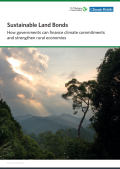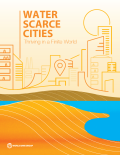Restoration of degraded land can create vast bioenergy crop potential, without constraining food crops or other land use options. This presents an important opportunity for African countries to develop modern, sustainable bioenergy from rapidly growing wood crops at the same time as pursuing ambitious forest landscape restoration initiatives.
Bioenergy from Degraded Land in Africa: Sustainable and technical potential under Bonn Challenge pledges presents a methodology to estimate the sustainable energy potential from land restoration in line with the Bonn Challenge, particularly as it relates to African countries. (The Bonn Challenge is a global effort to bring 150 million hectares of the world’s deforested and degraded land into restoration by 2020, and 350 million hectares by 2030.)
The African Forest Landscape Restoration initiative, AFR100, has set out to collect pledges to restore 100 million hectares of degraded land, mostly in in sub-Saharan Africa. To date, 18 countries have pledged to restore 75 million hectares.
Solar photovoltaic (PV) power generation has grown rapidly, from less than 1 gigawatt (GW) in 2000 to about 300 GW worldwide in 2017. Solar PV’s competitiveness against other sources of electricity has also continued evolving.
To track these crucial market trends, the International Renewable Energy Agency (IRENA) has developed Cost and Competitiveness Indicators for rooftop solar PV, based on the trends witnessed in key electricity markets.


Informal economic activities across much of sub-Saharan Africa provide crucial cash income and employment for both rural and urban populations. Governing the informal economy is recognised as a key policy challenge due to its contribution to local livelihoods and its common association with illegality, tax evasion and negative environmental impacts. In addition, because of the increasingly globalised trade in commodities, parts of the informal economy can also be supported by global sources of capital. This ‘globalised’ rural informal economy urgently calls for innovative policies, which maximise the benefits of global capital flowing directly to rural populations, while minimising the negative impacts associated with the environment, revenue losses and resource governance.
